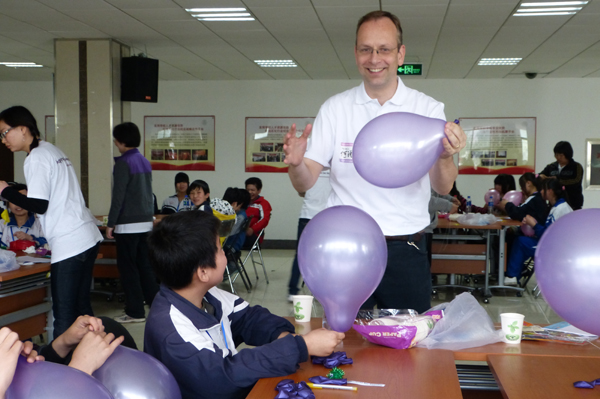Updated: 2012-04-21 21:49 By Huang Shuo (chinadaily.com.cn)
BEIJING - Pupils at migrant schools generally have few opportunities to study science. That all changed today for 250 9- to 11-year-olds from Mingyuan School in Beijing's Daxing District and Boshi School in Fangshan District.
The UK's Royal Society of Chemistry (RSC) and Institute of Physics (IoP) joined forces with the Migrant Children's Foundation (MCF), the European Science and Technology Fellowship Programme China (STF), the Beijing University of Chemical Technology (BUCT) branch of the China Youth League and the Volunteer Service Crew of BUCT, to invite the pupils and their teachers to spend the day at BUCT.

Professor David Evans, the chairman of the Royal Society of Chemistry Beijing Local Section, is giving a lecture on "Chemical Magic" for pupils from migrant schools at Beijing University of Chemical Technology on April 21, 2012. [Photo/chinadaily.com.cn/Huang Shuo]
In the morning, the chairman of the RSC Beijing Local Section, Professor David Evans from BUCT, gave a lecture on Chemical Magic, using a variety of colorful—and sometimes explosive—chemical reactions to illustrate his talk. He was followed by the IoP representative for China, Professor Richard de Grijs of the Kavli Institute for Astronomy and Astrophysics at Peking University, who introduced the pupils to some of the mysteries of the universe using exciting visual materials.
After lunch on campus, the older students, decked out in lab coats and safety glasses, carried out some chemistry and physics experiments while the younger students enjoyed a range of fun educational activities with volunteers from BUCT.
The logistics for the event were organized by the EU Science and Technology Fellowship Programme's team, who also provided the kids with a present to remember this day.

Professor Richard de Grijs, the representative of Institute of Physics for China, is doing physics experiments with pupils from migrant schools at Beijing University of Chemical Technology on April 21, 2012. [Photo/chinadaily.com.cn/Huang Shuo]
Helen Boyle, director of MCF, said, "This is an exciting project for everyone to be involved in. It is a great opportunity for migrant children to not only learn but to also be exposed to such creative and hands-on methods of teaching. It also allows volunteers to interact with and pass on their own learning experiences to a younger generation, which is one of MCF's main aims. Through projects like this one, we want to provide platforms for students with natural abilities or interests in these subjects to develop themselves and hopefully, through the help of MCF, RSC and IoP to take their education and learning even further."
RSC and IoP are now setting up portable labs in order to take similar events into migrant school classrooms in the future in order to give more disadvantaged children a chance to understand some of the wonders of science and its importance in our daily lives.

